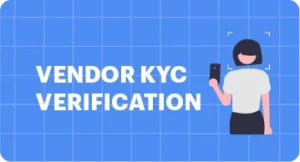VIPV KYC: The Comprehensive Guide to Video In Verification
Introduction
In the ever-evolving realm of finance and digital transactions, ensuring the identity and legitimacy of customers is paramount. Video In Person Verification (VIPV) Know Your Customer (KYC) has emerged as a potent tool to combat identity fraud and money laundering while offering unmatched convenience and security. This comprehensive guide delves into the world of VIPV KYC, exploring its significance, benefits, operational details, and compliance with SEBI guidelines.
What is VIPV KYC?
VIPV KYC stands for Video In Person Verification Know Your Customer. It is a process through which financial institutions and intermediaries verify the identity of their customers remotely using live video calls.
Why is VIPV KYC important?
VIPV KYC is essential in the digital age to combat identity fraud and money laundering, ensuring the security and integrity of financial transactions.
Benefits of VIPV KYC
- Enhanced Security: VIPV KYC minimizes the risk of identity theft and fraud by allowing a real-time, face-to-face interaction between the customer and KYC officer.
- Regulatory Compliance: Compliance with KYC regulations is essential for financial institutions to avoid hefty fines and maintain a trustworthy image.
- Remote Accessibility: VIPV enables customers to complete KYC processes from the comfort of their homes or offices, reducing the need for physical visits to brick-and-mortar branches.
- Paperless and Convenient: VIPV eliminates the need for physical paperwork, making the KYC process faster, more efficient, and environmentally friendly.
- Scalability: Financial institutions can efficiently onboard a large number of customers without compromising on security.
How does VIPV KYC work?
VIPV KYC involves a systematic process:
Step 1: Initiate the VIPV KYC Process
Customers initiate the VIPV KYC process through the financial institution’s website or mobile app. They provide consent and receive a verification code to confirm their intent.
Step 2: Prepare for the Video Call
Customers prepare for the video call by gathering the necessary KYC documents, such as Aadhar card, PAN card, passport, or driver’s license.
Step 3: Complete the Video Call
A secure video call is initiated between the customer and a trained KYC officer. During the call, customers present their identity and financial documents, which are verified in real-time. Face matching is conducted to ensure a match with the photo on their identity document.
Step 4: Review and Submit the KYC Documents
The KYC officer reviews the documents presented during the video call. If all requirements are met, the KYC application is approved, completing the process.
KYC Documents Required for VIPV KYC
- Identity documents: These include Aadhar card, PAN card, passport, driver’s license, or any other government-issued ID.
- Address proof: Documents such as utility bills, rental agreements, or voter ID cards may be required.
- Photographs: Passport-sized photographs may be needed for verification.
- Additional documents: Depending on the financial institution’s policies, additional documents may be required, such as income proofs or business-related documents.
Eligibility Criteria for VIPV KYC
To be eligible for VIPV KYC, customers typically must meet the following criteria:
- Must be a customer of a SEBI-registered financial institution or intermediary.
- Must have a valid and unexpired identity document.
- Must have a stable internet connection and a device with a camera for the video call.
VIPV KYC Best Practices
Tips for a Successful VIPV KYC Video Call
- Choose a well-lit, quiet, and private location for the video call to ensure clear communication and document visibility.
- Ensure your device’s camera and microphone are functioning correctly before the call.
- Have all required documents and photographs ready and within reach to minimize interruptions during the call.
- Be attentive and responsive during the video call to assist the KYC officer as needed.
Security Tips for VIPV KYC
- Never share your verification code or personal information with anyone other than the KYC officer.
- Verify the identity of the KYC officer before sharing any sensitive information.
- Use secure and trusted networks for the video call to prevent eavesdropping or data breaches.
- Report any suspicious activity or requests during the VIPV KYC process to the financial institution immediately.
VIPV KYC Troubleshooting
Common VIPV KYC Problems and Solutions
- Connectivity Issues: If you experience connectivity problems, try switching to a more stable network or troubleshooting your device’s internet connection.
- Document Verification Failures: Ensure that the documents you present are clear, legible, and unexpired. If document verification fails, contact the KYC officer for guidance.
- Technical Glitches: In case of technical glitches during the video call, report the issue to the financial institution’s customer support for resolution.
SEBI Guidelines for VIPV
The Securities and Exchange Board of India (SEBI) has issued comprehensive guidelines for Video In Person Verification (VIPV) as part of its broader regulatory framework aimed at ensuring the integrity and security of financial transactions. Here is a detailed breakdown of SEBI’s guidelines for VIPV:
- Authorized Intermediaries: Only SEBI-registered intermediaries are permitted to conduct VIPV. This means that the process should be facilitated only by entities that have the necessary regulatory approvals to carry out KYC on behalf of financial institutions.
- Secure Video Call: SEBI mandates that VIPV should be conducted through a secure video call platform. This ensures that the interaction between the customer and the KYC officer remains confidential and is not susceptible to interception or tampering.
- Clear Visibility: During the video call, both the customer and the KYC officer must be clearly visible. This requirement ensures that there is no room for impersonation, and the KYC officer can verify the customer’s identity effectively.
- Consent: Prior to initiating the VIPV process, customers must provide explicit consent to undergo video verification. This consent is typically recorded and serves as evidence of the customer’s willingness to participate in the process.
- Document Verification: Customers are required to present their identity and financial documents during the video call. These documents, such as Aadhar card, PAN card, passport, or driver’s license, must be examined by the KYC officer in real-time. Any discrepancies or anomalies should be flagged and investigated further.
- Face Matching: One of the critical aspects of VIPV is verifying that the customer’s live image matches the photograph on their identity document. This step further enhances the verification process’s accuracy and security.
- Geo-Tagging: To prevent impersonation, the location of the customer during the VIPV process is geo-tagged. This measure ensures that the customer is physically present in the specified location and not using pre-recorded video or other fraudulent means.
- Recording: SEBI guidelines require that the entire video call, including the conversation and document verification process, should be recorded and securely stored. These recordings serve as a record of the verification process and can be used for auditing and compliance purposes.
- Data Protection: Customer data collected during VIPV must be securely stored and protected from unauthorized access. Compliance with data protection regulations is a critical aspect of SEBI’s guidelines.
- KYC Officer Training: The KYC officers responsible for conducting VIPV must undergo thorough training to effectively carry out the verification process. Training should cover document examination, face matching, and adherence to SEBI guidelines.
Comparison of VIPV KYC with other KYC methods
VIPV KYC is just one of several methods used for Know Your Customer (KYC) verification. To provide a comprehensive understanding, let’s compare VIPV KYC with other common KYC methods:
-
Traditional In-Person KYC:
Process: Requires customers to visit a physical branch or location of the financial institution for document verification and face-to-face interaction with a KYC officer.
Pros: High level of assurance, minimal risk of impersonation, and comprehensive document verification.
Cons: Inconvenient for customers, time-consuming, and costly for financial institutions.
-
eKYC (Electronic KYC):
Process: Allows customers to complete KYC verification electronically by submitting scanned copies of documents online.
Pros: Convenient, paperless, and faster than traditional in-person KYC.
Cons: Limited document verification and potential for document forgery.
-
VIPV KYC (Video In Person Verification KYC):
Process: Involves a live video call between the customer and a KYC officer, where the customer presents identity and financial documents.
Pros: Enhanced security through real-time video verification, regulatory compliance, convenience for remote customers, and scalability.
Cons: Requires a stable internet connection, technical proficiency, and specific infrastructure for financial institutions.
-
Biometric KYC:
Process: Utilizes biometric data such as fingerprints or facial recognition for identity verification.
Pros: High security, difficult to impersonate, and quick verification.
Cons: Requires biometric data collection, which some customers may be hesitant to provide, and may have higher implementation costs.
-
OTP-based KYC:
Process: Customers receive a one-time password (OTP) on their registered mobile number, which they use to verify their identity during the KYC process.
Pros: Simple and quick verification process.
Cons: Vulnerable to SIM card swapping or mobile number theft, and may not provide as strong security as other methods.
In summary, VIPV KYC strikes a balance between security, convenience, and regulatory compliance. While traditional in-person KYC offers the highest level of assurance, VIPV KYC is well-suited for the digital age, where remote transactions are increasingly common. Each KYC method has its advantages and limitations, and financial institutions often choose the most appropriate method based on their specific needs and regulatory requirements.
Conclusion
Video In Person Verification (VIPV) is a critical component of Know Your Customer (KYC) processes for SEBI-registered intermediaries. It enhances security, convenience, and compliance while reducing operational costs. SEBI guidelines provide a framework for conducting VIPV securely and efficiently. To overcome onboarding challenges and ensure a smooth process, intermediaries can turn to advanced VIPV solutions like MSB Docs’ offering. By embracing VIPV and adopting cutting-edge solutions, financial institutions can navigate the evolving landscape of regulatory compliance with ease, providing a secure and seamless experience for their customers.
Unlock the guidelines for AML/CFT compliance in the insurance sector as prescribed by IRDAI in our informative post.
Explored the VIPV KYC world in our comprehensive guide? Ready to elevate your verification processes with Video In Person Verification? Take the next step with MSB Docs. Request a demo or book your free trial today.
FAQs
1. Is VIPV KYC legally recognized and compliant with regulations?
Yes, VIPV KYC is legally recognized and compliant with regulations, including SEBI guidelines. It is a secure and efficient method for verifying customer identities in the digital age while adhering to regulatory requirements.
2. What documents are required for VIPV KYC?
VIPV KYC typically requires identity documents like Aadhar card, PAN card, passport, driver’s license, or other government-issued IDs. Address proof documents such as utility bills or voter ID cards may also be necessary, along with passport-sized photographs.
3. How does VIPV KYC ensure the security of customer data during the verification process?
VIPV KYC ensures the security of customer data by conducting secure video calls on approved platforms, recording the entire process, and geo-tagging the customer’s location. This data is securely stored, and compliance with data protection regulations is maintained.
4. Can VIPV KYC be completed from anywhere, or does it require a physical presence at a specific location?
VIPV KYC can be completed remotely from anywhere with a stable internet connection and a device with a camera. Customers do not need to physically visit a bank branch, making it a convenient option.
5. How does VIPV KYC compare to other KYC methods in terms of security and convenience?
VIPV KYC offers a balance between security and convenience. It provides enhanced security through real-time video verification, ensuring regulatory compliance. While traditional in-person KYC offers the highest assurance, VIPV KYC is more convenient and suitable for remote transactions compared to other methods like eKYC or OTP-based KYC.





